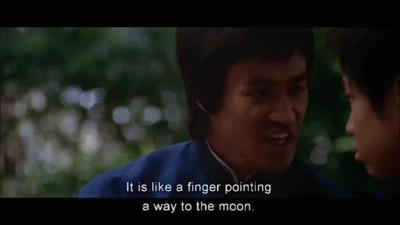Finger Pointing at The Moon
When Measurements Eclipse Our Goals
There are too many things in the world vying for our attention. We focus on the things important to us by pointing at them and shifting our gaze.
It is called the index finger because we use it to point at things. The word index comes from Latin, meaning to point or show.
We point at things to focus our attention. For example, when reading a dense document or making a presentation, we use a pointer to track the words on the page. Some of us might even be using a mouse to read this. We need those pointers. It guides our attention.
I
We have goals and aims. Our goals can range from something as simple as managing our weight, or we can more aim towards something nobler like improving the lives of our community/
To help us figure out how much closer we are moving towards our goals. We develop ways to help us track and measure our progress. We use indices, metrics and indicators, usually with numbers, to help us focus on variables that are important to our goals. Sometimes we use multiple indices too.
For example, we use the bathroom scale to tell us our bodyweight or the BMI to help us keep track of our health. A business may look at key performance indicators (KPIs) like sales figures or revenue to measure its performance. A government may look at GDP figures to gauge the state of the economy and the well-being of the people.
II
But there is the tendency to focus on the index. In the moment to moment, we rely on those measures to track our progress, and our attention goes to just those measures at the expense of the goals.
It’s a known problem that when the measurement becomes the target, it ceases to become a good measure. It’s known as the Cobra Effect, or Goodhart’s Law.
The Cobra Effect got its name from an anecdote back when India was under British colonial rule. The British government, concerned about a huge snake population, offered rewards for people handing in a dead cobra. The program was successful, but too successful, as more and more dead cobras were delivered over time instead of fewer.
The program incentivised breeding these snakes and then culling them for profit. The exact opposite of the actual goal: to shrink the cobra population. The means to an end becomes an end onto itself.
III
The flipside to the problem of indices and metrics is that we need them. Gut feelings and qualitative judgments, while valuable, lack the precision and objectivity of numbers.
Our knowledge of the world is incomplete and imperfect. Moreover, we live in a highly uncertain, chaotic world. We need something a lot more tangible than just our gut, we need something to hold ourselves accountable too.
Metrics are our compass in navigating through the chaos, by providing a sense of order. But being mindful that a sense of order, does not mean the world IS in order.
IV
The solution doesn't lie in rejecting metrics altogether, that’s just a mindless thing to do. But in embracing a mindful, thoughtful approach to where we point our attention to.
We must be deliberate in choosing what we measure, and keeping that intention in mind so that it aligns with our aspirations.
To figure out the right measures demands proactive experimentation to determine what we measure actually tracks our desired outcomes. This also requires constant reflection: we have to test our assumptions and adapt our measurements as needed.
Equally important, we have to acknowledge the limitations of our metrics. The things that we might miss and what variables go unnoticed. Ignoring these blind spots, and implicitly assuming that they hold no value, have consequences.
It could be focusing on what the bathroom scale says our weight is that we ignore our state of health, that is how we actually feel about our bodies. It could be businesses looking to pump up sales figures but not managing its rising costs. It could also be governments seeking to expand the GDP but not ensuring that the economic gains are redistributed to the people fairly.
Being mindful of how and what we measure enables an intentional engagement with the world.
We need to have an aim to point to. A way to guide our attention as we work towards that aim.
We need our indices and metrics. Measures are indispensible, that is true. But we cannot just rely on the measures but lose sight of the bigger picture. Our measurements are tools, they are but means to an end. We have to zoom out and remind ourselves of our true goals.
It’s like Bruce Lee said: “It's like a finger pointing away to the moon. Don't concentrate on the finger or you will miss all that heavenly glory.”
Read
Things just grow apart. Even for Celestial bodies. 😔
Watch
I’ve watched Hugh Jackman in The Wolverine and Logan. Both films were directed by James Mangold. Both films explore Wolverine’s mortality and how he deals with his heavy guilt of hurting bad people and good ones.
The Wolverine is really a fun movie set in Japan. It has this sheen of an intriguing and gritty thriller but it’s really a comicbook spectacle. I mean, Wolvering going up against the Yakuza, ninjas and a giant robot samurai? That’s pure comicbook joy!
Logan, in contrast, feels more like a serious film. It’s a violent movie with elements of neo-noir, western and cyberpunk tropes. Personally, I don’t think the movie is groundbreaking or revolutionary in any way. But for a tentpole, blockbuster franchise, Logan has great acting performance from stars Hugh Jackman, Patrick Stewart and Dafne Keen. The films best moments are its quieter scenes.
Listen
in keeping with the moon theme:



